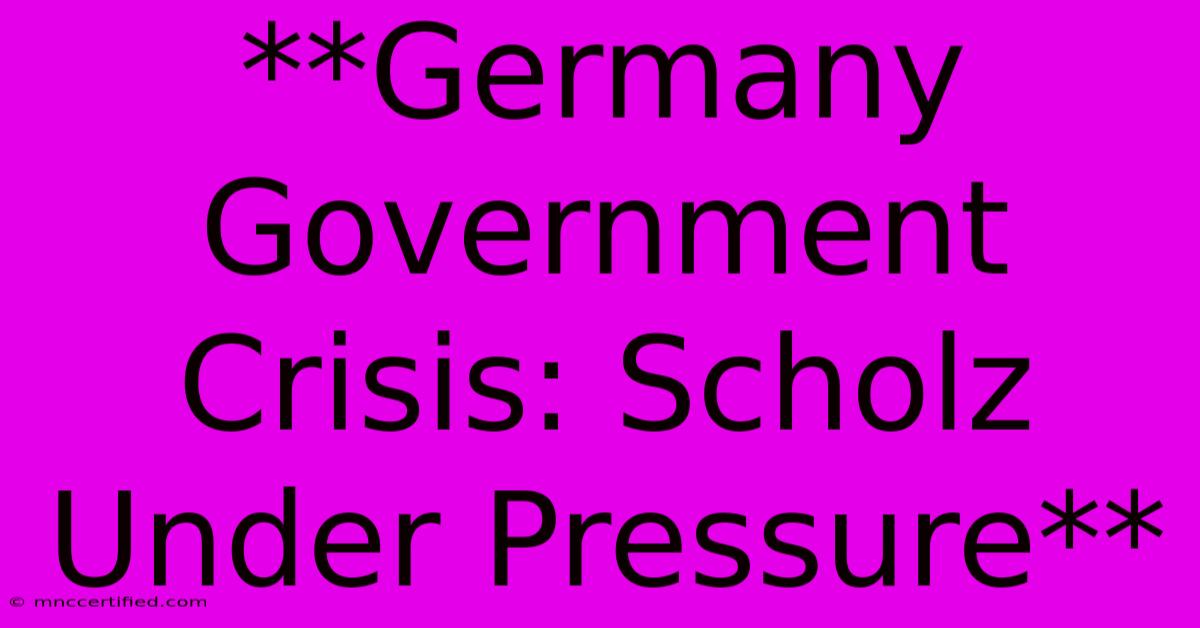**Germany Government Crisis: Scholz Under Pressure**

Table of Contents
Germany Government Crisis: Scholz Under Pressure
Olaf Scholz, Germany's Chancellor, finds himself facing a political storm as his government grapples with a series of crises, putting his leadership under intense scrutiny. The situation is complex, with internal divisions within the ruling coalition threatening to unravel the delicate balance of power.
The Roots of the Crisis: Inflation, Energy Costs, and Public Discontent
The current government crisis in Germany has its roots in a perfect storm of economic and political pressures.
- Soaring Inflation: Germany, like many other countries, is experiencing record levels of inflation, driven by the war in Ukraine and global supply chain disruptions. This has significantly increased the cost of living for German citizens, leading to widespread public discontent.
- Energy Crisis: The dependence on Russian energy, coupled with Moscow's actions in Ukraine, has created a major energy crisis in Germany. The government's efforts to secure alternative sources of energy have been met with mixed success, adding to the economic strain.
- Internal Disagreements: The coalition government, composed of the Social Democratic Party (SPD), the Green Party, and the Free Democratic Party (FDP), has been plagued by internal disagreements on key issues. These disagreements range from economic policy to social reforms and have created a fragile and unstable political landscape.
Key Points of Friction:
- Defense Spending: The FDP has advocated for a significant increase in defense spending, while the Greens have been more hesitant, leading to tensions within the coalition.
- Climate Policy: The Green Party's focus on climate change has also led to conflict with the FDP, particularly over energy policy and the phasing out of coal-fired power plants.
- Economic Stimulus: The government is divided on the best approach to address the cost of living crisis. While the SPD supports more direct financial assistance, the FDP favors a focus on structural economic reforms.
The Impact on Scholz's Leadership
The government crisis has significantly impacted Chancellor Scholz's leadership. His approval ratings have declined, and his ability to unite the coalition and steer the country through these challenges has been questioned. Critics argue that he has been indecisive and lacking in political leadership.
Potential Outcomes:
The current crisis has the potential to lead to several different outcomes, including:
- Coalition Collapse: If the internal tensions within the coalition government continue to escalate, it could lead to a breakdown in the governing partnership and a premature end to Scholz's chancellorship.
- Shift in Policy: To stay in power, Scholz may be forced to make significant concessions to the FDP and Green Party, leading to a shift in policy direction.
- Early Elections: If the coalition collapses and a new government cannot be formed quickly, early elections may be necessary.
Germany's Future Uncertain
The current crisis in Germany highlights the challenges facing Europe's largest economy. The country's ability to navigate the economic and political storms ahead will depend on the government's ability to find common ground and implement effective solutions. The outcome of this crisis will have a significant impact on not only German politics, but also on Europe's future.
Keywords: Germany, Scholz, government crisis, coalition, inflation, energy crisis, public discontent, defense spending, climate policy, economic stimulus, political leadership, coalition collapse, policy shift, early elections.

Thank you for visiting our website wich cover about **Germany Government Crisis: Scholz Under Pressure**. We hope the information provided has been useful to you. Feel free to contact us if you have any questions or need further assistance. See you next time and dont miss to bookmark.
Featured Posts
-
Shetland Returns New Season Finds Its Way
Nov 08, 2024
-
Starbucks Holiday Menu Whats New For Nov 7
Nov 08, 2024
-
Imputed Income Life Insurance Calculator
Nov 08, 2024
-
Man Utd Europa League Match Time And Tv
Nov 08, 2024
-
Farmers Insurance Employee Benefits 2024
Nov 08, 2024